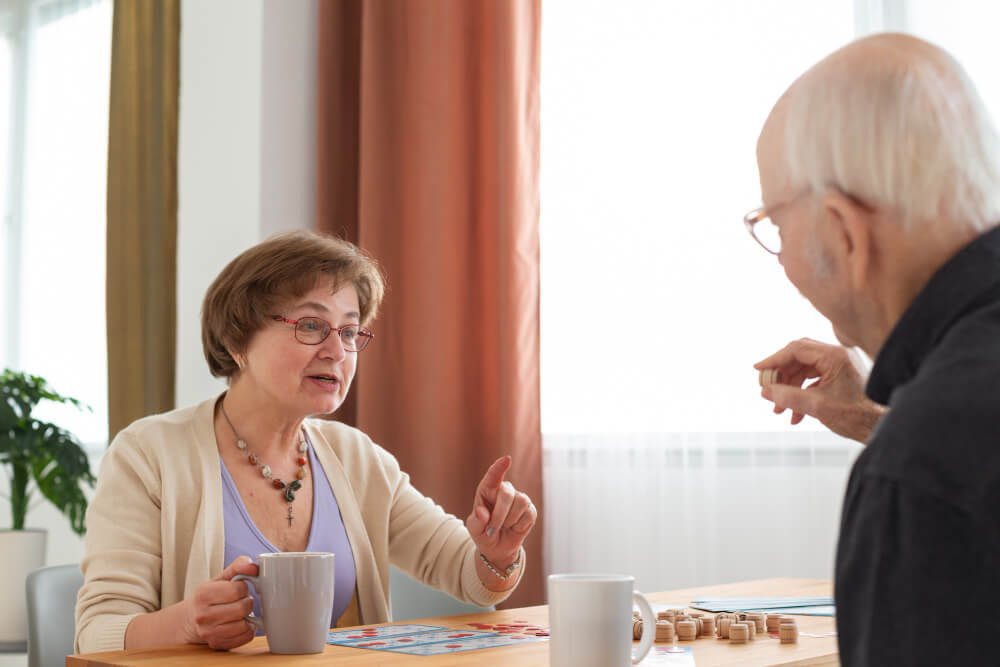Effective communication is the bedrock of compassionate care for individuals grappling with Dementia. The ability to express needs, share concerns, and foster meaningful connections relies heavily on communication.
When confronted with the complexities of Dementia, where cognitive functions are gradually compromised, the significance of effective communication takes center stage. For individuals with Dementia, communicating with loved ones becomes a formidable challenge as the condition advances.
Understanding the barriers that hinder communication is a crucial step toward providing the empathetic and tailored support that these individuals need.
Let’s delve into the intricacies of effective communication strategies for dementia caregivers.
Barriers to Communication in Dementia
When Dementia takes its toll, a myriad of barriers hinders smooth communication. Memory loss, language impairment, and changes in behavior contribute to a complex communication gap. Caregivers must grasp the nuances of these challenges to tailor their approach and foster a supportive environment.
Communication Strategies for Enhanced Understanding
Navigating the communication challenges associated with Dementia requires caregivers to embrace tailored strategies that accommodate the evolving needs of individuals. From maintaining positive non-verbal cues to employing simplicity in language, these strategies form the scaffolding for effective communication.
- Maintain Positive Non-Verbal Cues: Use facial expressions, tone of voice, and body language to convey warmth and reassurance to an individual grappling with Dementia. Maintain an eye contact to establish a connection.
- Speak Clearly and Calmly: The caregivers must use simple and concise sentences. Moreover, the caregivers must speak slowly, articulate each word, and allow time for the person to process information.
- Use Familiar and Concrete Language: The caregivers must opt for familiar words and phrases. Avoiding abstract concepts and using concrete terms for an individual grappling with Dementia enhances understanding.
- One-Step Instructions: Break down tasks into simple, one-step instructions. Provide guidance and support as needed without overwhelming the patient.
- Engage in Active Listening: Acknowledge the person’s feelings and validate their emotions. Respond to the emotional tone rather than just the words.
- Encourage Expression through Art and Music: Creative activities for dementia patients like music art can provide alternative means of expression and communication, tapping into emotional memories.
- Use Visual Aids: Visual cues, such as pictures, charts, or written notes, complement verbal communication and assist in conveying messages.
- Establish Routine and Consistency: Maintain a consistent routine for individuals with Dementia. It fosters a sense of security and aids in communication.
- Be Patient and Flexible: Allow time for the person to respond. Be patient and avoid rushing. Adapt communication strategies based on the individual’s needs and preferences.
Enhancing the Well-being of Individuals with Dementia through Effective Caregiver Communication
Dementia can profoundly affect an individual’s ability to communicate. As the condition progresses, cognitive decline, memory loss, and language difficulties become more pronounced. Caregivers are pivotal in bridging these communication gaps and creating a supportive environment.
Pay attention to the significance of caregiver communication and enhance the quality of life for individuals coping with Dementia.
Building Trust and Connection
Effective caregiver communication fosters trust and emotional connection between the caregiver and the individual with Dementia.
Non-Verbal Communication Techniques
Given the challenges in verbal communication, caregivers can employ non-verbal techniques to convey messages, such as facial expressions, gestures, and body language. It enhances understanding and provides comfort to individuals with Dementia.
Adapting Communication Strategies
Understanding that Dementia affects each person differently, caregivers must adapt their communication strategies accordingly. For example, some individuals respond better to visual cues, while others benefit from simplified language.
Active Listening and Validation
Caregivers should attentively listen to the individual’s verbal and non-verbal cues. It promotes a sense of dignity and helps in managing potential behavioral challenges associated with Dementia.
Promoting Independence through Communication
Effective communication empowers individuals with Dementia. Caregivers can encourage communication by asking open-ended questions, allowing the individual to share their thoughts, preferences, and concerns. This involvement in decision-making processes positively impacts their self-esteem.
Minimizing Frustration and Agitation
Frustration and agitation are common in individuals with Dementia due to communication difficulties. Effective caregiver communication minimizes negative emotions by creating a calm and reassuring atmosphere. The clear approach reduces stress for both the caregiver and the individual.
Educating and Supporting Caregivers
Recognizing the importance of effective communication, caregiver education is essential. Training programs provide caregivers with valuable skills, insights, and techniques to enhance communication with individuals with Dementia.
Wrapping Up
Effective communication in dementia care requires ongoing evaluation and adaptation. Caregivers should remain attuned to the individual’s changing needs and take key considerations for senior care in mind to adjust strategies accordingly. Regular collaboration with healthcare professionals, including speech therapists and dementia specialists, can provide additional guidance tailored to the specific challenges presented by the individual and the stage of Dementia.






